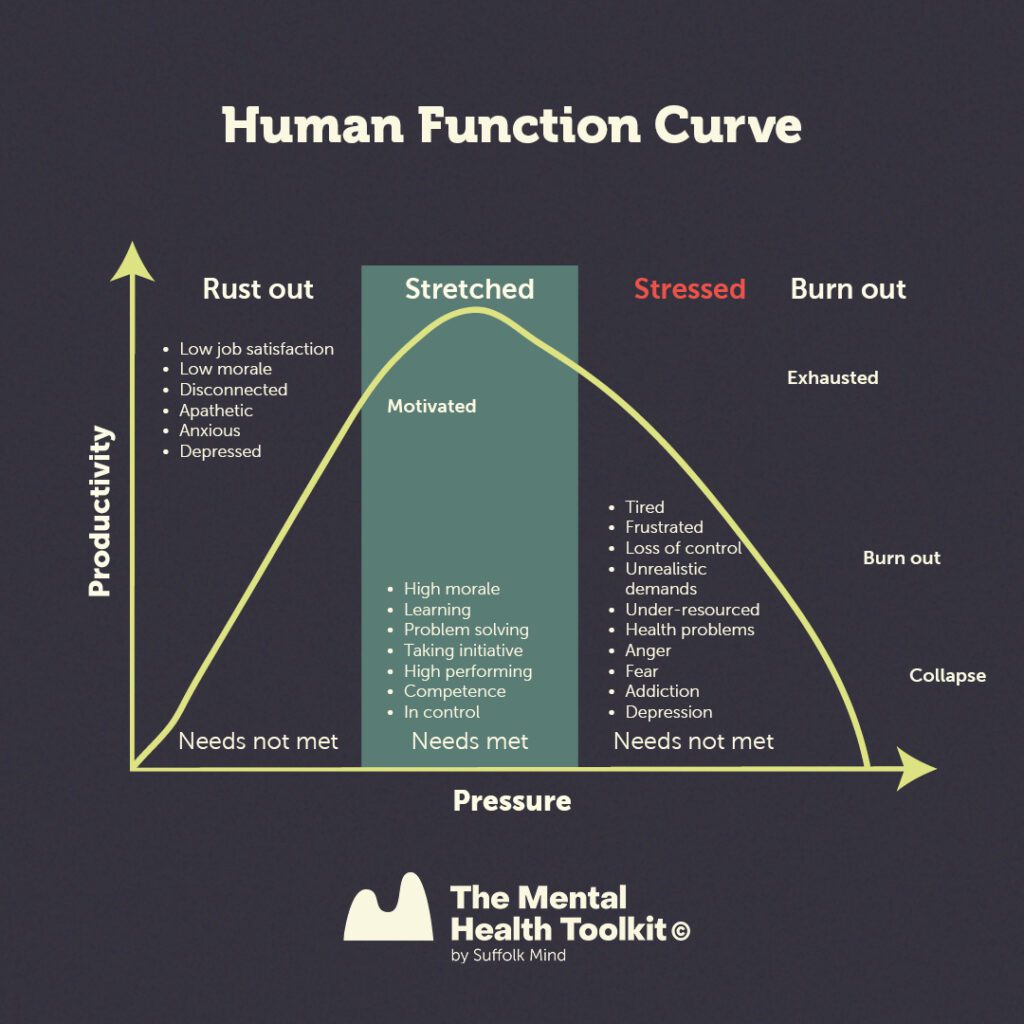How stress works as our natural warning system

Stress can often feel like it has come out of nowhere – and it can be hard to pinpoint why you feel the way you do. But just like with how a smoke alarm might warn us of a house fire, or a car dashboard displays a warning light – stress is our body’s natural way of telling us our needs aren’t being met.
What causes stress?
Stress is nature’s way of telling us one or more of our Emotional Needs aren’t being met. These are the needs which, when met in balance, help us feel happy and healthy.
Each of us have 12 Emotional Needs we need to meet:
- Food & Drink, Movement and Sleep
- Control, Security and Privacy
- Achievement, Status and Meaning & Purpose
- Community, Attention and Emotional Connection
If we don’t meet these needs, we can start to feel stressed. That’s especially true if we don’t meet them for a longer period of time, or if we are struggling to meet several at once.
All of us are on the Mental Health Continuum – and our place on it is dependent on how we feel. Stress is what we refer to as the crossover point from wellbeing to mild to moderate mental ill health.
That’s why it’s important for us to recognise stress and the ways it make us feel – as it can differ from person to person.
For some, that might include headaches, a change in our sleeping pattern or a difficulty concentrating.
Can a ‘little stress’ be good for us?
Some people might tell you that a ‘little stress is good for you’ as it might help you get things done. In reality, we should never ignore stress as our body’s natural alarm system and what it is trying to tell us.
It is by recognising what has caused you to feel stressed that you can manage it. That could be changes at work which are affecting how you meet your needs for Control and Security – or pressures in the family that mean you aren’t meeting your needs for Privacy, Attention and Emotional Connection.
Even smaller surprises to your day like encountering roadworks on your daily commute can cause stress to rear its head.
A good way to manage your stress is to assess the things that are out of your control. If we look at changes at work as an example, you could improve your need for Security by starting a small savings pot or cutting some costs at home.
Family pressures could be alleviated by giving yourself some ‘you time’ to help meet your need for Privacy. That could be taking 10 minutes to listen to your favourite music, engage in your favourite hobby or practice breathing techniques.

Rust out and burn out
Just like with the Mental Health Continuum, we are also all on the Human Function Curve. You can think of it a bit like a rollercoaster, in that it starts and ends at a low point with a big high in the middle.
At the highest point on the curve, you’ll see ‘stretch’ – which is replaced by ‘stress’ as pressure mounts and productivity drops.
Those low points at either side are known as ‘rust out’ and ‘burn out’.
So, what do all these terms mean?
For a start, it’s important to understand the differences between feeling ‘stretched’ and feeling ‘stressed’.
Stretch is when you feel motivated and you are achieving. Being out of your comfort zone can be a great feeling that pushes you to be the best you can be.
In short, you have the resources you need to get the job done.
Stretch feels like you are:
- In control
- Taking initiative
- Achieving
- Learning
- Growing and developing
- Problem solving
- Having ideas
Not feeling stretched is when you will experience ‘rust out’. This is when you are not being stretched and you do not feel like you’re achieving something. This isn’t exclusive to the workplace, but could be felt at home or when you’re engaging in a hobby.
Rust out means your needs are not being met – and it’s time to find new ways to stretch yourself.
Feelings associated with rust out include:
- Low satisfaction
- Low morale
- Anxiety
- Depression
- Low self esteem
- Feeling disconnected
This indicates that your Emotional Needs are not being met, and you need to look for ways to stretch yourself, either personally or professionally.
On the flipside, too much stress can cause burn out. This is where pressure becomes too much and productivity drops.
Again, it means your needs are not being met – and it’s time to find ways to meet them again. A good place to start could be writing a list of the things you can and can’t control.
Feelings associated with burn out include:
- Tiredness
- Frustration
- Loss of control
- Anger
- Fear
- Depression
Looking to train your staff about mental health and the signs of stress and stretch? Learn more about our training courses here. You can also learn more about The Mental Health Toolkit approach on the Suffolk Mind website.
Our key workshops and courses
Speak to us today




